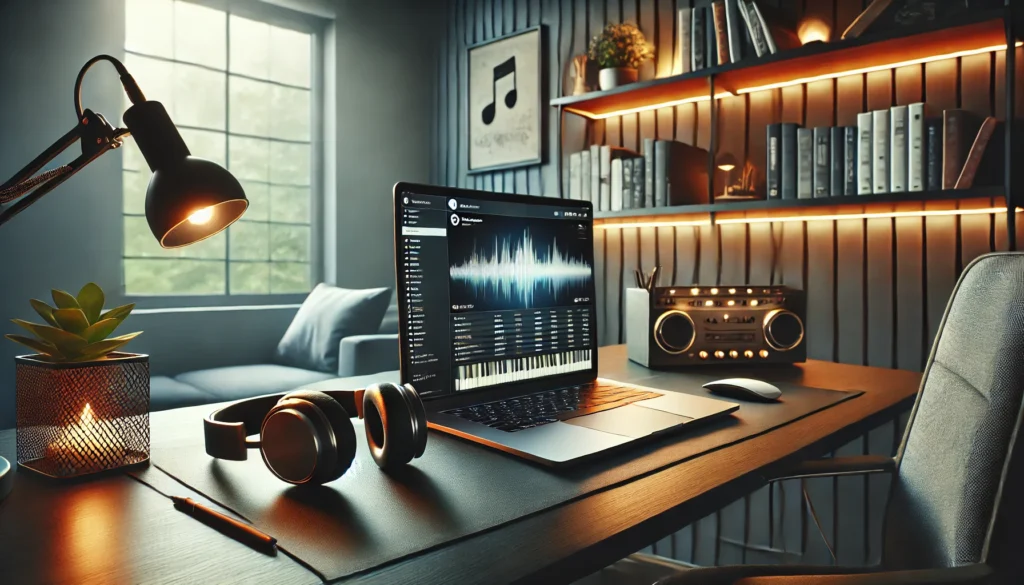Key Takeaways
The Music and Productivity Guide:
- The right music can significantly improve focus and productivity for most people, backed by scientific research.
- Different types of work require different soundtracks – deep work benefits from instrumental music while repetitive tasks pair well with upbeat rhythms.
- Personal preference matters enormously – experiment to find your ideal sound environment rather than following generic recommendations.
- Volume and tempo directly impact work performance – moderate volume and appropriate tempo selection can optimize your workflow.
- Sometimes silence is golden – recognize when music becomes a distraction and adjust accordingly.
Introduction
Can music actually make you more productive? Scientific research strongly suggests it can. Studies from institutions like the University of Miami have demonstrated that the right musical accompaniment helps people complete tasks more efficiently and accurately.
But the relationship between music and productivity isn’t straightforward. The impact varies dramatically based on the type of music, the nature of your work, and your personal preferences. The wrong soundtrack might actually hinder your progress rather than help it.
This guide explores the fascinating connection between sound and work performance. We’ll examine the science behind how music affects your brain during work, identify which genres enhance different types of tasks, and help you create the perfect audio environment for your unique workflow. Whether you’re looking to improve focus, boost creativity, or simply make monotonous tasks more enjoyable, understanding how to harness the power of music can transform your workday. I hope this music and productivity guide help you get there!
How Music Affects the Brain and Productivity
Music’s influence on our cognitive function runs surprisingly deep. When you press play on your favorite work playlist, you’re actually triggering a complex series of neurological responses.
Your brain processes music through multiple regions simultaneously. This widespread activation can improve cognitive function and strengthen neural pathways related to memory. Ever notice how easily you can recall lyrics from songs you haven’t heard in years? That same memory-enhancing power can be harnessed for work.
When you listen to music you enjoy, your brain releases dopamine and endorphins – neurotransmitters associated with pleasure and reward. This chemical cocktail creates a positive emotional state that helps maintain motivation through challenging tasks. It’s like giving your brain a tiny reward system that keeps you engaged with your work.
Different sound frequencies affect cognitive performance in various ways. Lower frequencies tend to promote relaxation, while higher frequencies can enhance alertness. This is why bass-heavy music might help you unwind after work, but probably isn’t ideal for maintaining focus during complex analytical tasks.
The tempo of music also directly influences your physiological state. Your heart rate and breathing naturally synchronize with musical rhythms in a phenomenon called entrainment. This explains why upbeat music energizes you while slower compositions have a calming effect – your body is literally keeping time with the beat.
The Best Types of Music for Focus and Efficiency
Not all music will help your productivity. The wrong sounds can hijack your attention and derail your workflow. Understanding which types enhance focus can make all the difference.
Instrumental vs. lyrical music presents one of the clearest distinctions. When a song contains lyrics, part of your brain automatically processes that linguistic information. If you’re reading, writing, or doing anything language-related, this creates cognitive competition. Your brain struggles to process both the lyrics and your work simultaneously. Instrumental music bypasses this issue, providing stimulation without verbal interference.
Classical and Baroque compositions have earned their reputation as productivity powerhouses. These genres typically feature structured, predictable patterns that improve spatial-temporal reasoning. Bach, Mozart, and Vivaldi composed works with consistent rhythms and harmonies that seem to complement cognitive processes. The Brandenburg Concertos or The Four Seasons provide stimulation without unpredictable elements that might disrupt concentration.
Lo-fi beats and ambient music have surged in popularity for good reason. These genres create a sonic cushion that masks distracting noises without demanding attention. The subtle, repetitive patterns establish a consistent audio environment that helps maintain focus. Lo-fi’s slightly imperfect sound quality also prevents the brain from becoming overly engaged with the music itself.
Binaural beats and white noise offer more utilitarian approaches to enhancing focus. Binaural beats work by playing slightly different frequencies in each ear, creating a third “phantom beat” that can help synchronize brainwaves to specific frequencies associated with concentration. White noise works differently, creating a consistent sound backdrop that masks distracting environmental noises.
ALSO: The Musician’s Guide to Meditation

Music for Different Types of Work
The ideal soundtrack varies dramatically depending on what you’re trying to accomplish. Matching your music to your task can significantly improve your performance.
Deep work – those cognitively demanding tasks requiring sustained concentration – benefits from music with minimal surprises. Instrumental compositions, particularly classical or ambient pieces, provide gentle stimulation without jarring transitions or distracting elements. The music creates a consistent audio environment that helps maintain focus without competing for attention.
Shallow tasks like answering emails, data entry, or routine administrative work pair well with more engaging music. These activities typically require less deep thought, so your brain has more capacity to process complex compositions. Familiar music often works best here, as your brain doesn’t need to allocate resources to process novel sounds.
Creative work responds particularly well to certain genres. Jazz, with its improvisational nature, seems to stimulate divergent thinking. Classical music can enhance problem-solving abilities. Even ambient nature sounds create an expansive mental space conducive to generating new ideas. Volume matters significantly for creative tasks – moderate levels provide stimulation without overwhelming cognitive resources.
Repetitive tasks benefit from music with a strong beat and engaging melodies. The psychological boost from upbeat songs can transform monotonous work into something more enjoyable. Electronic music, pop, and other high-energy genres help maintain motivation and energy throughout tedious activities. The tempo directly influences your work pace – faster beats generally increase energy and efficiency for mechanical tasks.
Some people truly perform best in complete silence. If you find yourself in this camp, don’t feel pressured to force music into your workflow. Consider creating alternating periods of silence and sound throughout your day to maximize benefits while preventing mental fatigue.
Personalized Productivity Playlists
Creating customized playlists tailored to your specific work patterns can dramatically boost your efficiency and enjoyment. The key lies in thoughtful curation rather than random selection.
Start by identifying your primary work types. Do you spend most of your day writing code? Analyzing data? Creating visual designs? Different cognitive tasks respond better to different musical structures. Once you understand your work patterns, select music with minimal distractions – generally instrumental, ambient, or white noise works best for concentration-intensive work.
Experiment methodically with different genres, tempos, and artists. Keep notes on which music helps you enter flow states most easily. Many people discover surprising musical affinities – a classical music skeptic might find Bach’s mathematical compositions perfect for coding, while a metal enthusiast might concentrate best with ambient soundscapes during deep work sessions.
Modern streaming services offer extensive resources for productivity-oriented listening. Spotify features carefully curated productivity playlists like “Deep Focus,” “Soft Piano,” and “Instrumental Study.” Apple Music offers similar collections designed specifically for concentration. YouTube has become a treasure trove for productivity music, with hours-long lo-fi beats, classical compilations, and binaural focus sessions.
Pay particular attention to volume and tempo. Research suggests moderate volume levels (around 70 decibels) create optimal conditions for creative thinking and focus. This moderate noise level creates just enough distraction to encourage abstract thinking without overwhelming cognitive resources. For tempo, slower compositions (60-80 BPM) generally aid concentration, while faster tempos can energize repetitive or mechanical tasks.
The Downsides of Music While Working
Despite its potential benefits, music isn’t always conducive to productivity. Understanding when sound becomes counterproductive is essential for optimizing your work environment.
Music can become a distraction when it contains unpredictable elements that capture attention. Complex jazz improvisations, dramatic classical pieces with sudden dynamic shifts, or songs with surprising structural changes demand cognitive resources. Your brain instinctively shifts focus to process these novelties, pulling attention away from your primary task. If you find yourself listening more than working, your music choice may be too engaging.
Personal preference plays a crucial role in music’s effectiveness. What works for someone else might completely disrupt your concentration. Some people genuinely perform better in silence or with minimal background noise. Consider experimenting with different sound environments throughout your workday, including periods of complete quiet, to find your optimal balance.
Open offices and loud environments present particular challenges. In these settings, music through headphones often serves as a defense mechanism against distraction rather than a productivity tool itself. Noise-canceling headphones can create a more controlled audio environment, blocking unpredictable sounds while allowing you to work with or without music. White noise machines or apps can similarly reduce disruptive background noise without adding potentially distracting musical elements.
Cognitive overload occurs when your brain processes too much sensory information simultaneously. Complex music, especially at high volumes, can exhaust mental resources that would otherwise be dedicated to your work. If you’re feeling mentally fatigued while working with music, try simplifying your audio environment or embracing silence for a period.
Conclusion
Music has remarkable potential to shape your productivity landscape. The right soundtrack can enhance focus, boost creativity, maintain motivation, and make even monotonous tasks more enjoyable. However, the perfect audio environment varies dramatically between individuals and different types of work.
The key lies in thoughtful experimentation and personalization. Rather than following generic recommendations, pay attention to how different music affects your specific work patterns. Create dedicated playlists for different cognitive states – one for deep analytical work, another for creative brainstorming, and perhaps a third for administrative tasks.
Consider implementing a more dynamic approach to your work soundscape. Try alternating between periods of music and silence throughout your day. Use upbeat tracks to energize yourself through energy slumps, and calmer compositions to maintain focus during complex tasks. Adjust your volume levels based on the cognitive demands of your current work.
Remember that what works for others might not work for you. Some people genuinely perform better in complete silence. Others find that different genres enhance different types of thinking. Your optimal productivity soundtrack is as unique as your working style.
The science is clear that music can significantly impact your work performance. The art lies in discovering precisely which sounds help you reach your highest potential. Start experimenting today, and you might be surprised by how the right music transforms not just your productivity, but your entire relationship with work. I hope this music and productivity guide help! Thank you for checking in!











